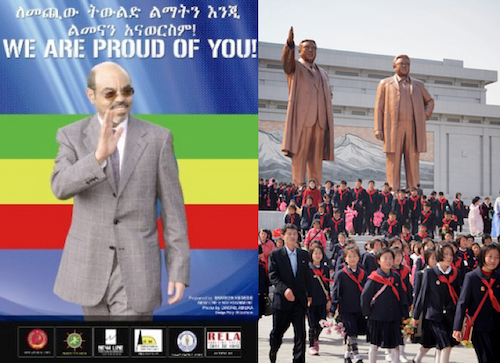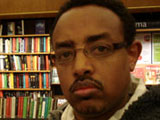Songs and Images of Dictatorship in Ethiopia
by Mesfin Negash / June 29, 2012 / 15 Comments
Meles Zenawi and the Cult of Personality

Left: Meles Zenawi's image dominates Ethiopia. Right: Statue of Kim Jong-il. Photo: flickr user Joseph A. Ferris III, Creative Commons.
In 2008 I had to visit the central police investigation headquarters in Addis Ababa. In one of the offices I noticed that there were two images of the Prime Minister: One on the back of a postcard on the table, and the second in a frame behind the officer.

- Why does a country with her own unique alphabet and long history of writing persist to deny citizens the right to freedom of expression in this era of Expression? No other country in Africa may typify this paradox more than Ethiopia. As Leopold Senghor’s famous collection of poems entitled “Ethiopiques” remained ‘powerful and popula’ so does the source of his intriguing title, Ethiopia, in her own ways. In “Ethiopiques,” I share Ethiopian views on pertinent issues related to journalism, culture and, of course, the overarching subject of politics.

- Mesfin Negash is an Ethiopian journalist living in exile in Sweden. He is one of the journalists accused of “terrorism” in 2011 by the Ethiopian government. The co-founder and first editor-in-chief of an acclaimed Ethiopian newspaper, Addis Neger, he is currently the Managing Editor of Addisnegeronline.com. He is a political science student by training and known for his critical commentaries on significant political and social issues.
Thanks to my acquaintance with the officer, our discussion turned friendly after a few minutes. As I bid farewell I dropped a passing remark about the two images. “Have you bought the images, or are they awards?” It was becoming customary to give the image of PM Meles Zenawi as prizes or awards to “top performing” employees in some places.
The officer smiled, “The party publishes the images, the police buy and distribute. If you refuse to hang this picture, you will be demoted for fictitious reasons. Trust me, by next year they will order us to hang his image around our neck.”
Dictators throughout history have some kind of obsession with their own image. From Ramses II of Egypt in 1400 BC, to Meles Zenawi of Ethiopia in 2012, erecting one’s own image has remained a common denominator among dictators. But some dictators demand more than just images or statues. Kim Il Sung had a song praising him as the saviour of North Korea. Ben Ali, Hosni Mubarak, and Muhammad Gaddafi were among the most notorious for covering all visible walls with their images. Their countries not only had to invest in erecting those symbols of repression and despair, they also had to pay to dismantle them.
Ethiopia’s PM Meles Zenawi is following the footsteps of these brutal dictators in building a cult of personality. Images depicting him as a national hero and a visionary leader who is beloved by his people have been posted everywhere. Additionally, a once vocal critic-turned-blind-supporter has released a song praising the beauty of Meles Zenawi’s eyebrows. Yes, his eyebrows. No one knows what leadership has to do with the beauty of one’s eyebrows, but the song is calling the PM to continue leading the country with his unparalleled wisdom. “Yketil liku sew,” it says: Let the wise man continue leading us. Call it “Kim syndrome” as the song is a mild Ethiopian version of Kim Il-Sung’s song.
To complete the irony, PM Meles Zenawi once told us that he doesn’t like personality cults and doesn’t allow or encourage his image to be posted everywhere. Next he will tell us that he wasn’t aware of the images of him all over the country. However, in a typical dictatorial style his images are all becoming larger, more visible, and more imposing. Local authorities even compete to impress their party bosses with the best images of Zenawi. His party has no image but of him.
But none of the images or songs impress the public. Recently his new image, posted in one of the popular squares in the capital, disappeared shortly after its erection.
The police officer I met in 2008 brings to mind Vaclav Havel’s famous greengrocer:
“We have seen that the real meaning of the greengrocer’s slogan has nothing to do with what the text of the slogan actually says. Even so, this real meaning is quite clear and generally comprehensible because the code is so familiar: the greengrocer declares his loyalty (and he can do no other if his declaration is to be accepted) in the only way the regime is capable of hearing…”





15 Comments on "Songs and Images of Dictatorship in Ethiopia"
Trackbacks for this post